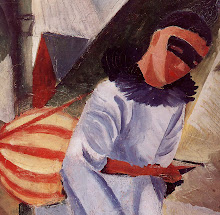Nevertheless, the ground still yields buried secrets from that time. Recently, while working on a new subway station in Berlin, workers unearthed some sculptures that had been featured in the Nazis' notorious "degenerate art" exhibit. They had been housed in the home of one Erhard Öwerdieck, and were entombed beneath the rubble of that home when it became a casualty of airstrikes on Berlin. The full story, from The New York Times, is here. The sculptures are now on display in the Neues Museum, Berlin's museum of archaeological antiquities. (This, itself, is a subtle plea by Germans for the right to move on.)
First minor quibble: "How they ended up underground near City Hall is still a mystery; it seems to involve an Oskar Schindler-like hero." At first, I balked - Schindler saved people, not sculptures - but read on, as it seems that Öwerdieck actually was Schindleresque.
Second minor quibble - the final two paragraphs:
Farther down the block the Deutsches Historisches Museum’s Hitler exhibition, today’s version of a “Degenerate” show, means to warn viewers about succumbing to what present German law declares morally reprehensible. How could any decent German have ever been taken in? the show asks.Late? Small measures? This is rather too begrudging. One would think the Germans had done nothing to atone between the end of the War and now.
That happens to be the question the Nazis’ “Degenerate” show posed about modern art. Many more Germans visited that exhibition than the concurrent one of approved German art. Maybe Oewerdieck was among those who went to the modern show and saw these sculptures in it. In any case, today’s Germany has salvaged them and has organized this display. Redemption sometimes comes late and in small measures.


No comments:
Post a Comment